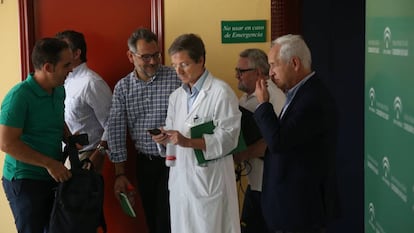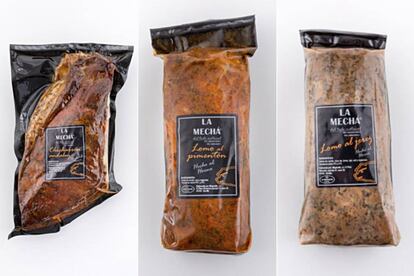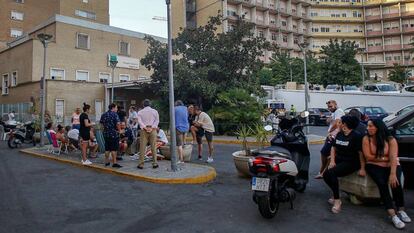Tests reveal listeria in three products from Seville food company Magrudis
The bacteria have also been located on the production line used to make La Mechá foods, thought to be the origin of the current outbreak of listeriosis, the worst Spain has ever seen

Tests carried out on larding needles used by the Seville-based company Magrudis to make a pork loin product called carne mechada have returned positive results for the presence of the bacteria Listeria monocytogenes, according to documents to which EL PAÍS has had access. This confirms that its processing plant is one of the infected sites behind the current outbreak of listeriosis that has so far affected 200 people throughout Spain, most of them in Andalusia. A 90-year-old woman died in the early hours of Monday in a Seville hospital after having contracted the bacterial infection, while it emerged on Friday that a terminal cancer patient had died with listeria in their bloodstream. It is not yet clear, however, whether that patient’s death was related to the outbreak.
If the larding needles were contaminated, there is no doubt that other areas of the production line were too
Professor Juan José Rodríguez
Carne mechada, the product produced by Magrudis that is thought to be behind the outbreak, the biggest ever seen in Spain, is made by cooking pork loin in its own fat. The lard is introduced into the meat using larding needles before it is cooked. It is then usually served cold and in thin slices. The company sells the carne mechada, along with other similar products – such as lomo, preserved pork loin, and chicharrones, pork belly – under the brand name La Mechá. Seville City Hall confirmed on Friday that two other La Mechá products have been found to be contaminated: pork loin with sherry, and pork loin with paprika.
Spain issued an international alert on Thursday with European authorities and the World Health Organization (WHO) “given the possibility that cases might be detected in other countries,” should tourists visiting the country have consumed the affected products. So far no cases have been detected outside Spanish territory.

It also emerged on Friday that the carne mechada produced by Magrudis had been sold on to a firm called Comercial Martínez León for resale with a different brand name. The authorities were not aware of this fact until August 20, five days after the initial health alert was raised. These products were in circulation until they were ordered to be withdrawn on August 21.
Samples were taken from the company’s production plant last Friday, and the results were returned on Monday. The analysis of the larding needles was the first to become public knowledge.
Listeriosis is a bacterial infection that can cause sepsis, meningitis and encephalitis, and can even be fatal
“If the larding needles were contaminated, there is no doubt that other areas of the production line were too,” said Juan José Rodríguez, a professor at the Autonomous University of Barcelona and a member of the Spanish Society of Food Safety. Rodríguez explained that the “larding needle is an instrument used to fill raw meat, meaning that the bacteria should not survive the roasting process, and the final contamination may have taken place during another moment on the production line.” He added that the results were “worrying, because they reveal widespread contamination that was unknown to the heads of the company.”
This new information points to a twofold failure in the Magrudis production line, according to experts consulted by EL PAÍS. The first, which has now been confirmed, implies a lack of hygiene in the processing plant itself. The second is the failure to detect the contamination of the final meat products, despite existing legislation obliging such producers to carry out tests on at least five samples of every batch produced.
These rules mean that food-production companies must design and execute a plan to guarantee that their products are put on the market with no risks to human health. Each firm has the freedom to carry out such plans however they see fit, but they are subject to regular inspections from the health authorities.
The current outbreak of listeriosis has so far affected 200 people throughout Spain, most of them in Andalusia
As well as carne mechada, Magrudis also produces eight more products at its plant. The regional government in Andalusia, known as the Junta, requested that Seville City Hall carry out tests on these products on August 19 and ordered them to be taken off the market on August 21, a move that sources from the Junta said were precautionary. The central Health Ministry in Madrid advised on Thursday that consumers should not eat any of the products made by the Seville-based firm.
The tests carried out on the plant prompted tensions on Thursday between the Andalusian government – headed up by the conservative Popular Party (PP) and center-right Citizens, with the support of far-right Vox – and the acting health minister, María Luisa Carcedo of the Socialist Party (PSOE). The spokesperson from the Junta’s committee in charge of managing the listeriosis crisis, Doctor José Miguel Cisneros, expressed his discomfort yesterday over statements made by Carcedo in which she confirmed that the outbreak had originated in the Seville company. “The Health Ministry is not intervening here because these powers are transferred to the autonomous regions,” Cisneros stated.
On Friday, it was reported that 82% of new cases in Andalusia were registered in Seville. In total, there were 99 people receiving hospital treatment, 17 more than on Thursday. Of these, 31 are pregnant women. Four people are currently being treated in intensive care, one more than the previous day. Of those in hospital, 18 have been confirmed to have listeriosis, while the remainder of patients are still being tested.
Listeriosis is a bacterial infection that can cause severe illnesses such as sepsis, meningitis and encephalitis, and can even be fatal. Those most at risk are pregnant women, the elderly, unborn babies and newborns, or people whose immune systems are compromised. The infection can also cause gastroenteritis and fever. It is primarily transmitted, as in this current outbreak in Spain, by the ingestion of contaminated foods.
Fears over infections see Seville hospitals swamped

Social alarm over the listeriosis outbreak has seen emergency rooms in Seville overwhelmed by an increase in potential patients. On Wednesday night, medical staff from the Virgen del Rocío hospital, one of the biggest in the Andalusian capital, dealt with 100 more people than usual, 23% above the average. The majority had symptoms of the bacterial infection, according to a spokesperson from the Junta committee managing the crisis. The pressure on medical teams is such that doctors are resorting to WhatsApp groups to request help to cover shifts and draft in reinforcements, according to messages to which EL PAÍS has had access.
Despite extra staff being drafted in, the wait times in the emergency room at Virgen del Rocío on Thursday evening were as high as four hours, and the personnel at the hospital were overwhelmed. Zahara Palos, a 28-year-old woman, arrived at 3pm with symptoms of diarrhea and fever. She was not seen by doctors until 7pm. "I'm desperate," she complained. "I want to leave here with a solution."
English version by Simon Hunter.
Tu suscripción se está usando en otro dispositivo
¿Quieres añadir otro usuario a tu suscripción?
Si continúas leyendo en este dispositivo, no se podrá leer en el otro.
FlechaTu suscripción se está usando en otro dispositivo y solo puedes acceder a EL PAÍS desde un dispositivo a la vez.
Si quieres compartir tu cuenta, cambia tu suscripción a la modalidad Premium, así podrás añadir otro usuario. Cada uno accederá con su propia cuenta de email, lo que os permitirá personalizar vuestra experiencia en EL PAÍS.
¿Tienes una suscripción de empresa? Accede aquí para contratar más cuentas.
En el caso de no saber quién está usando tu cuenta, te recomendamos cambiar tu contraseña aquí.
Si decides continuar compartiendo tu cuenta, este mensaje se mostrará en tu dispositivo y en el de la otra persona que está usando tu cuenta de forma indefinida, afectando a tu experiencia de lectura. Puedes consultar aquí los términos y condiciones de la suscripción digital.








































